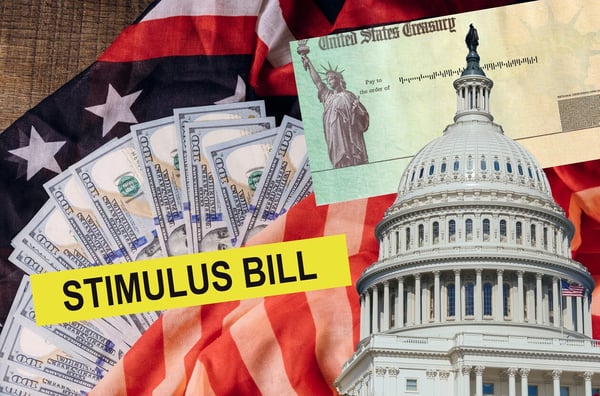Amid ongoing negotiations between Secretary Mnuchin and House Speaker Nancy Pelosi, Senate Republicans continued to advance an economic assistance bill of their own this week. But what's the difference between the Senate bill, the one in negotiation between Democrats and the White House, as well as other proposed aid packages? Let’s walk through the different pieces of proposed legislation and the likelihood of what, if anything, could pass before the November 3rd election.

The Senate “Skinny Bill”
Let’s start with the “skinny bill” that was proposed by Senate Majority leader McConnell (R.-Ky) and came up for a vote on Wednesday of this week. The measure failed 51-44 along party lines, not receiving the 60 votes needed to pass.
According to a report by CNN, this bill includes a $300 individual boost for unemployment benefits and new federal aid for small businesses. This bill also includes federal funding for school re-openings with much-needed funding support for the US Postal Service. It addresses COVID-19 liability protection by setting limits on who can sue if they contract COVID-19. However, there will be no stimulus checks to taxpayers (included in an earlier GOP proposal) or additional funding for cash-strapped states. Several Republican Senators had previously voiced their opposition to this bill and it had no support from Democrats. Look for portions of this bill to be negotiated into a new aid package proposed by Senate Republicans as they seek to keep any stimulus package on a slim budget.
Other Stand Alone Bills
- $1,200 stimulus checks: One thing the White House, Democrats and Republicans agree on is direct payments to qualified individuals. CNET did a great piece on the breakdown of this potential stimulus payment for taxpayers.
- On Tuesday of this week, the Senate attempted but failed to pass a standalone $500 billion package aimed at extending the Paycheck Protection Program. This program was part of the CARES Act aimed at providing forgivable loans to small businesses in order to keep employees on the payroll.
- Airline Assistance: As we reported previously, the airline industry has been hit hard during this pandemic. This one seems to also be under universal agreement by all parties. House Speaker Pelosi has recently stated the earlier passed House airline support bill of $28.8 billion could be a starting point for further negotiations.
- Funding the US Post Office: This one is split among party lines, with House Democrats passing funding this summer and Senate Republicans refusing to take it up. Concern remains about the lack of funding and support for the US Post office as we rapidly approach the November 3rd election.
The White House 1.8 Trillion Dollar Stimulus Package
While the Republican-controlled Senate is strongly opposed to this package in its current (working) form, Majority leader McConnell has said if the package makes it to the Senate he’ll bring it to a vote. On Tuesday, October 20th, McConnell (R-Ky.) was reported to have warned the White House NOT to strike a deal with House Speaker Pelosi before the November 3rd election, leaving in question where Senator McConnell’s priorities lie--with his reelection campaign or the people and businesses struggling during the pandemic?
Pelosi and Mnuchin have been negotiating for weeks, and one has to give both sides credit for their continued perseverance. Their combined goal is to have this piece of legislation ready before the election, but they’ve both stated if a goal isn’t reached before then they will keep going on negotiation talks until an agreement is reached.
The $1.8 trillion White House offer includes:
- Another $1,200 stimulus payment (as noted above): This would be for all eligible adults and a boost to the dependent payments to $1,000 for qualifying child dependents.
- Unemployment benefits of $400/week
- Funding for coronavirus testing and tracing: The White House conceded on this point from previous negotiations and currently claims they’ll include money for testing and tracing in this aid package.
- State and local funding: This proposal includes $300 billion for cities and states. This is a big issue for the White House and Democrats to still agree upon.
The House Democrats' $2.2 Trillion (Updated) Heroes Act
The Heroes Act was passed in the House on Oct. 1, 2020, predominantly along party lines. This bill has been revised and is the base from which House Democrats negotiate. Key highlights of this bill include:
- $1,200 individual stimulus payments: Pelosi agrees with the White House on the $1,200 per individual payment with an additional $500 for each dependent.
- Payroll assistance for small businesses and airline workers.
- Reauthorization of the $600/week unemployment benefits through 01/2021.
- Increased funding for state and localCOVID-19 testing and screenings, as well as pay for first responders and healthcare workers.
- Housing assistance for renters and homeowners.
Stimulus Aid Unlikely to Pass Before Election
As of the most recent news, it seems increasingly unlikely that any one of these stimulus packages will pass before the November 3rd elections, as reported by multiple sources in both parties. In theory, an agreement between House Democrats and the White House could be reached before the election, but getting that passed through both chambers is not likely by that deadline. There remains sharp disagreements within the GOP as well as the remaining disagreements between Speaker Pelosi and Treasury Secretary Mnuchin.
If you find this information insightful, sign up for our newsletter here so you can stay up to date on legal industry news, insight and technology. In addition, join ABC Legal Services for a free webinar Wednesday, October 28, 2020, at 11:30 a.m. PDT | 2:30 p.m. EDT called, “A New Day in Court: Technology and the Legal System.” Those interested can register for the free webinar here.
About ABC Legal Services
ABC Legal is the nation’s leading service of process and court filing company and is the official process server to the U.S. Department of Justice. Docketly is a subsidiary of ABC Legal, providing appearance counsel on a digital, custom-built platform that smoothly integrates with our applications and services. ABC Legal’s applications are cloud-based and compatible for use on desktop, browser and smartphones. Our solutions and digital approach ensure process server partners, law firm customers and their clients save valuable time and resources when serving legal notices safely and with maximum compliance, control and transparency. ABC Legal is based in Seattle, WA, with more than 2,000 process servers throughout the U.S., as well as internationally in more than 75 countries. To learn more about ABC Legal, our solutions and subsidiary company Docketly visit www.abclegal.com.
Written by
ABC Legal ServicesService made simple—down the road and across the country. Join the 50,000+ professionals who trust ABC Legal for service of process.







